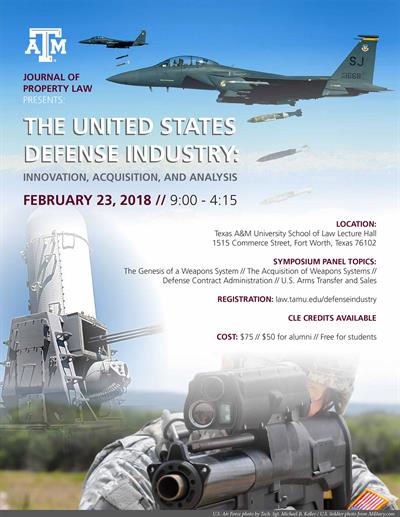Texas A&M Journal of Property Law
Spring 2018 Symposium
The United States Defense Industry: Innovation, Acquisition, and Analysis
Presented by: Texas A&M Journal of Property Law
Reviewed by: Ron Parent, Staff Editor
 The U.S. government wields the greatest arsenal of weapons in the world. Have you ever wondered how the government acquires a weapon, who makes the weapon, or perhaps what laws regulate the industry? February 23, 2018, Texas A&M School of Law hosted a unique symposium focused on these questions and more.
The U.S. government wields the greatest arsenal of weapons in the world. Have you ever wondered how the government acquires a weapon, who makes the weapon, or perhaps what laws regulate the industry? February 23, 2018, Texas A&M School of Law hosted a unique symposium focused on these questions and more.
More than eighty attendees settled into the Texas A&M School of Law Lecture Hall as Michael W. Mutek delivered the morning keynote, which set the stage for a stimulating day of presentations and panel discussions. Mr. Mutek, of Steptoe & Johnson LLP, is the proud father of a Texas A&M Law graduate. Mr. Mutek highlighted the complexity of the laws governing federal acquisition, the great amount of time necessary to shift policy and the overall difficulty of implementing reforms.
The first panel: "The Genesis of a Weapons System," included Mr. Mutek; along with Andrew Hunter, from the Center for Strategic and International Studies; and Michael Capps, director of Strategic Development for Raytheon Intelligence and Information Systems. Professor Lisa Rich moderated the first panel, noting her excitement due to her extensive work in public policy and passion for the national defense topic. The panel discussed the global market for weapons, the proliferation of cyber-attacks and defenses, as well as the complexity of acquisition laws and challenges of sequestration on policy goals.
The primary theme of the first panel was that the government may make an order far in advance, perhaps ten years, to allow for development of a new technology, but sometimes a need is identified that can be met in as little as two weeks. Vendors for weapons systems must be both nimble and able to play the long game to compete for the work, and there exists an inherent conflict between transparency and flexibility as it relates to government processes.
The second panel: "The Acquisition of Weapons Systems," included Darwin Hindman III, of Baker Donelson; Jack Toner, Associate Counsel for Research, Development, and Acquisition of the Navy; and Pat Lisowski, F-35 Program Attorney for Lockheed Martin. This panel focused on the Federal Procurement Process. Dean Aric Short moderated a very interesting panel of individuals who each hold different roles in the acquisition process.
Hindman typically serves as outside counsel, often representing unsuccessful parties to a bid proposal that want to challenge the results and/or the winning bid in review. Jack Toner, as counsel for the Navy, represents the government interests in transactions, from purchase orders to regulatory discretion in emergencies. Pat Lisowski gave an energetic presentation from the government contractor’s perspective, which touched on change orders due to mid-development specification updates as well as the overall success of the F-35 program in delivering quantities of planes to several of the top medal-earning countries at the ongoing winter Olympics.
During the lunch hour, some of the esteemed panelists gave the Aggie Law students in attendance a bit of history, explaining how they had entered the industry and risen to the positions that they now hold. Each speaker advised taking the opportunities that come along with a focus on learning as much as possible to carve out a niche and create value. The other overarching theme from the lunch session was the aging workforce across the industry. Employment prospects appear good, as many of the major players in the industry will be retiring to make room for the next wave of attorneys that enter the defense industry.
The third panel: "Defense Contract Administration," included Texas A&M Law Professor Thomas Duffy; and Chris Puffer, Vice President and General Counsel at Elbit Systems of America. Professor Lynn Rambo moderated the panel as the discussion touched on the regulatory complexity with regard to oversight and governance, budget constraints, and maintaining the supply chain. Professor Duffy shared a few stories from his personal experiences managing various aspects of the missile defense program. Chris Puffer discussed the oversight functions and the numerous interactions with various auditing agencies that put strains on the supply chain.
The fourth and final panel of the day included Joseph Kavan, from Kutac Rock, LLP; Chadwick Ford, of Lockheed Martin, and Colonel Brooks McFarland '91, United States Air Force. The panel titled U.S. Arms Transfer and Sales, touched on everything from the sale of new warplanes to the disposition of aging equipment. Both Mr. Kavan and Mr. Ford gave insights into the laws that regulate the transfer of various types of arms nationally and internationally. The transactions can be quite complex and the recipients must be trusted allies.
Col. McFarland ended the discussion by sharing his personal experience leading United States forces and the challenges of meeting the warfighters' needs in the field and furthering the National Security Strategy. Col. McFarland’s message gave life to each of the speakers that presented before him by highlighting the importance that the process supports the mission.
As Professor Rich echoed Col. McFarland’s comments on the National Security Strategy in her closing remarks, bringing the conversation full circle back to where Mr. Mutek began with Steptoe and Johnson’s mission: “postured to support today’s military, tomorrow’s, and the future.” Professor Rich added: “The genius of creative Americans, and the system that enables them, is critical to American security and prosperity.”